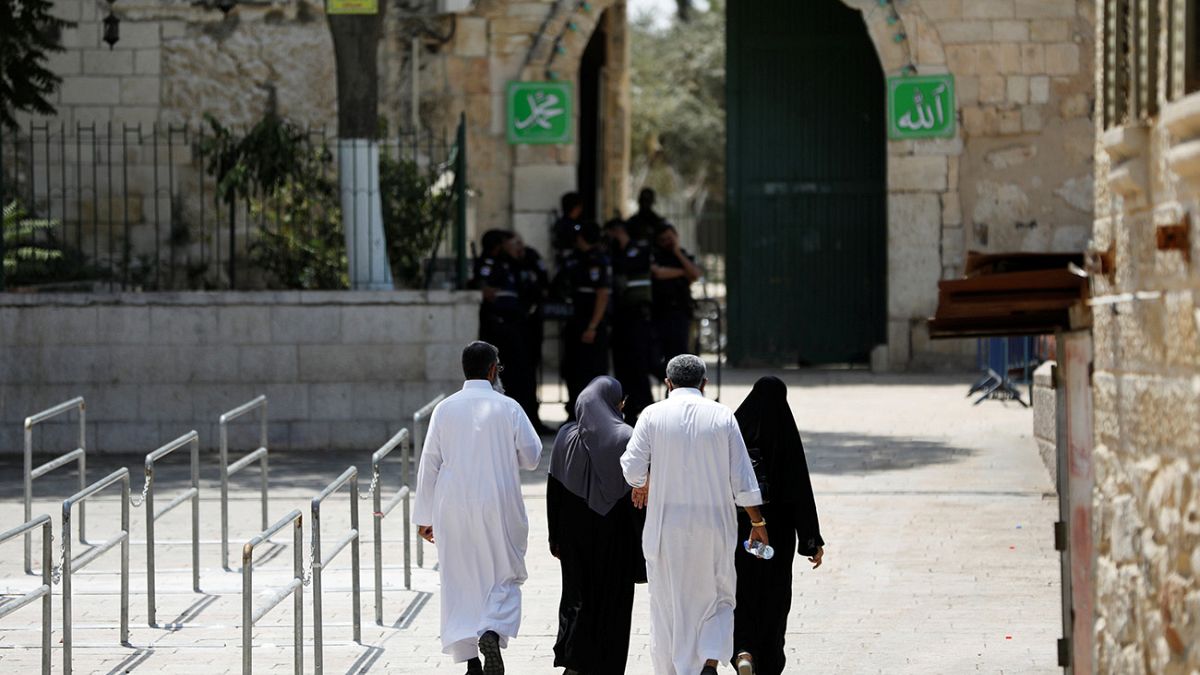Thousands of Palestinians prayed outside the site on Tuesday in protest at Israel's modified security measures.
Israel’s removal of metal detectors from Jerusalem’s most sensitive holy site has failed to appease Palestinians.
Thousands prayed outside on Tuesday night, heeding a call not to enter in protest at Israel’s actions.
Earlier Israel said it had decided to replace the detectors with what it called “smart checking devices” at the Temple Mount, known to Muslims as the al-Aqsa mosque.
Palestinian religious and political leaders dismissed the changes. The detectors had been installed at entry points to the site after two police guards were fatally shot by Arab-Israeli gunmen on July 14 – setting off the worst clashes between Israelis and Palestinians for years.
“All new Israeli measures put in place since that date until today must be removed so things can go back to normal in Jerusalem and we can resume our work regarding bilateral relations,” the Palestinian President Mahmoud Abbas said on Tuesday, confirming that the freeze in relations with Israel would continue.
The senior Muslim cleric who oversees the al-Aqsa compound also dismissed the new Israeli measures. The Waqf, the religious body that runs the Islamic sites inside, said worshippers would continue to stay away and pray in the streets outside.
Israeli Prime Minister Benjamin Netanyahu’s security cabinet voted to remove the metal detector gates early on Tuesday after a meeting lasting several hours. A statement said ministers had decided to heed a recommendation of Israeli security organisations – and that up to 100 million shekels (24 million euros) had been allocated for new equipment and extra policing over the next six months.
Israeli media said there were plans to invest in advanced camera systems; reports said workers were seen near the compound beginning to install overhead metal beams to hold closed-circuit TV cameras.
At the United Nations in New York, Israel’s response to the Palestinian leadership was furious.
“Israel’s top priority is to maintain the safety and security of all Temple Mount worshippers and visitors. The Palestinians top priority is to ignite violence…(Palestinian President Mahmoud) Abbas not only has the audacity to claim he seeks peace but actively funds, promotes and glorifies terror,” said Danny Danon, Israel’s Ambassador to the UN.
What is happening in occupied East Jerusalem? pic.twitter.com/msd1dCeCJC
— Middle East Eye (@MiddleEastEye) July 25, 2017
The deaths of three Israelis and four Palestinians in violence late last week raised international alarm and prompted the UN Security Council to meet, seeking ways to defuse the crisis.
The UN’s Middle East envoy has called for tensions to be eased ahead of Friday prayers, saying they risk spreading.
The White House has praised “the efforts of Israel to maintain security while reducing tensions in the region”. Washington has held talks with Israel and Jordan, which is the custodian of Jerusalem’s Muslim holy sites.
Amid sporadic clashes, both sides are under international pressure to calm the row. But some say various factions have an interest in stoking tensions further.
The dispute is about far more than security equipment imposed after the policemen were killed; the site is highly symbolic for both sides. Palestinians see an attempt by Israel to exert further control. Israel says it needs to secure Judaism’s most holy site.
Five takeaways from the Temple Mount and Jordanian crises https://t.co/Rcieg3DNdT#ArabIsraeliConflictpic.twitter.com/zF4jNwBOWW
— The Jerusalem Post (@Jerusalem_Post) July 26, 2017
